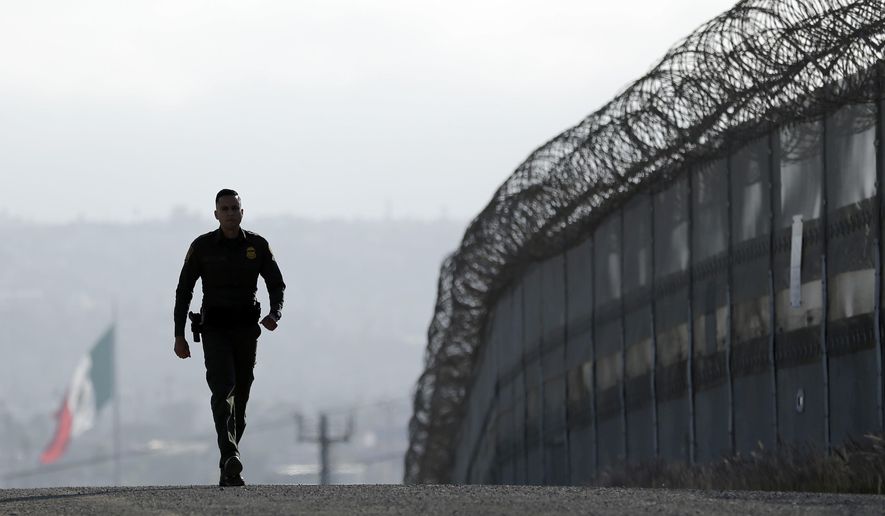Maria Esperanza Diaz Ruiz had expected to pay a smuggler to get across the U.S.-Mexico border. Then she learned that the Biden administration’s new program would let her walk into the country at no cost as long as she had a tale of woe from back home.
She is one of the migrants taking advantage of a Biden policy that is converting illegal immigrants into legal “parolees,” a status that offers a work permit and a foothold in the U.S., according to the Center for Immigration Studies, which observed Ms. Diaz Ruiz and others.
“This is real,” she told the center’s Todd Bensman. “This is not a magic trick.”
Her justification for gaining parole, she said, is that she worked for a Nicaraguan government official who was homosexual. Her ex-husband threatened her and her boss, she told Mr. Bensman.
“I had to leave because I would be killed,” she said.
Armed with documents and a criminal background check, she joined a group of roughly two dozen migrants who were entered into the U.S. border authorities’ system, driven to the border crossing between Mexicali and Calexico, California, and turned over to federal authorities.
SEE ALSO: Assaults on Border Patrol agents rise as border chaos spreads
Mr. Bensman got unfettered access to Mexico’s side of the processing and published his findings last week.
He said crossings are not just at ports of entry along the border. Some immigrants are flown from Cancun or Monterrey directly into U.S. airports.
“This looks to be part of a purposeful strategy to create workarounds to court-ordered expulsion policies but also to reduce politically painful illegal crossing statistics by channeling ever more people through these legalized crossings,” he said. “While neither DHS nor the White House has publicized this legalized entrance program, DHS Secretary Alejandro Mayorkas has repeatedly telegraphed it in his oft-stated intentions to create ‘legal pathways’ as part of the administration’s overarching ‘safe, orderly, and humane’ vision for southern border immigration.”
The program relies on Mr. Mayorkas’ power of “humanitarian parole.” The secretary can admit people into the U.S. outside of the usual systems for temporary or immigrant visas.
This administration isn’t the first to rely on parole, but its application of the process is the most wide-ranging. Authorities have flexed their power to bring in Afghan evacuees, Ukrainians who want to avoid the war in their country, and hundreds of thousands of people from myriad countries who show up at the southern border.
Parole grants a one-year permission to be in the U.S. Mr. Mayorkas can choose to renew it, but those on parole can also apply for asylum or find another way to gain more permanent legal status.
Even if they don’t, there is little chance that they will be ousted at the end of the year, given U.S. Immigration and Customs Enforcement’s limited resources and Mr. Mayorkas’ orders to restrict deportations.
Some legal experts say parole has been bent far beyond its intent, which was to welcome, on a case-by-case basis, those with an urgent humanitarian need or a “significant public benefit.”
Chief Justice John G. Roberts Jr. hinted at that during an oral argument at the Supreme Court this year on the Biden team’s push to end the Trump-era “Remain in Mexico” policy.
“It gets to a question of the interpretation of the parole provision and whether or not, I think, significant public benefit can accommodate as — as far as you want to stretch it,” he told the government’s attorney.
Justice Brett M. Kavanaugh said the court has given wide latitude to administrations to determine what is in the public interest on parole.
Judging by the numbers streaming north, the Biden administration will need that latitude.
The Mexican operation in Mexicali is tripling its size to handle the number of people.
Mr. Bensman said there is reason to be skeptical of the worthiness of the cases.
The U.S. requires evidence of difficulties in home countries, but substantiation can be created after the fact. He said university law professors and students help migrants file police reports by phone with authorities in their home countries and use that as evidence for their claims.
One local pastor told Mr. Bensman that the law students coach the migrants to beef up their claims.
The pastor said he heard that officials in Tijuana, to the west of Mexicali, demand bribes to get migrants on their lists.
• Stephen Dinan can be reached at sdinan@washingtontimes.com.




Please read our comment policy before commenting.